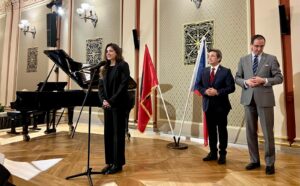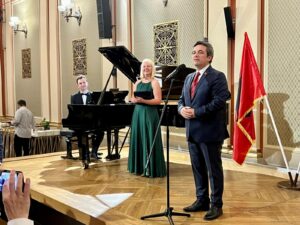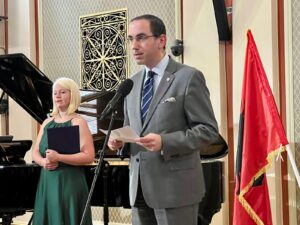- Hans Weber
- March 27, 2025
05.12.2024 Celebrating Independence and Unity: Albanian National Day
On 5th of December H.E. Ilir TepelenaD invited the representatives of the diplomatic corps and Albanian locals in the Czech Republic to celebrate together on the premises of the Rudolfinum in Prague.
The Deputy of the Cabinet Minister of Foreign Affairs of the Czech Republic Mr. Jan Marian spoke on behalf of the Czech Republic
Albanian National Day, celebrated on November 28th, is a momentous occasion that resonates deeply with Albanians worldwide. Known as **Dita e Pavarësisë** (Independence Day), it commemorates the declaration of independence from the Ottoman Empire in 1912. This day is rich in history and national pride, marking a pivotal chapter in the journey towards Albania’s sovereignty and highlighting the spirit of resilience and unity that defines the country.
A Historical Milestone: Declaration of Independence
November 28, 1912, is a landmark date in Albania’s history. On this day, Ismail Qemali hoisted the Albanian flag in the town of Vlorë, declaring Albania’s independence and ending more than four centuries of Ottoman rule. The event marked the culmination of efforts to achieve national autonomy during a period of regional turmoil within the declining Ottoman Empire.
The declaration ensured the recognition of Albania as a unique entity within Europe’s contested landscapes. It represented the victory of the Albanian national consciousness, a longing expressed through language, culture, and tradition that persisted even under foreign dominion.
Celebrations Across the Nation
Today, Independence Day is celebrated with great fervor across Albania, reflecting both historical reverence and contemporary spirit. In cities and towns, the Albanian national flag—a striking red field with a black double-headed eagle in the center—is prominently displayed, symbolizing unity and the courage of its people.
The day is marked by parades, cultural events, and public ceremonies. In the capital city, Tirana, official proceedings begin with speeches from political leaders and dignitaries, emphasizing national achievements and the importance of unity and progress. The day is often accompanied by concerts showcasing traditional and modern Albanian music, drawing crowds in lively celebrations.
Historical sites, particularly in Vlorë, become pilgrimage destinations where people gather to pay homage to the visionaries of independence. Educational institutions engage in programs about Albania’s history, instilling national pride and awareness among the younger generations.
Recognition of National Heroes
Independence Day is also a time to remember and honor national heroes who played critical roles in achieving and sustaining liberty. Figures such as Ismail Qemali and Isa Boletini are celebrated for their leadership and dedication to national causes. Their contributions are highlighted in media, academic discussions, and various public commemorations.
Additionally, the day acknowledges the vast network of patriots and visionaries in the Albanian Renaissance—a cultural and political movement that championed the cause of national identity and sovereignty throughout the 19th and early 20th centuries.
Diaspora Celebrations
For the Albanian diaspora, November 28th serves as a tie to their homeland and an opportunity to showcase Albanian heritage and identity around the world. Communities gather in cities where strong Albanian populations reside—such as New York, London, Athens, and Melbourne—in a vibrant expression of national pride through traditional dancing, music, and culinary festivals.
Albanian expatriates and descendants maintain a strong connection to their roots, celebrating shared history and culture while also promoting an understanding of Albania in their local environments. These celebrations contribute to a rich, multicultural dialogue in their communities, strengthening international networks.
Looking Toward the Future
Albanian Independence Day is not only a tribute to the past but also a reflection of the nation’s present ambitions and future prospects. As Albania moves forward, discussions on ongoing challenges, including economic growth, EU integration, and infrastructure development, are at the forefront of Independence Day dialogues.
The day reaffirms Albania’s commitment to advancing democratic ideals, human rights, and regional stability. It is a testament to the transformative power of collective will and perseverance.
Conclusion
Albanian National Day is a celebration of freedom, history, culture, and unity. It highlights the journey of a resilient people who, despite significant challenges, have steadfastly worked towards maintaining sovereignty and promoting national identity.
Each year, November 28th serves as a reminder not only of the Albanian struggle for independence but also of the enduring values it embraced—courage, perseverance, and unity. As Albania continues to navigate its path on the global stage, Independence Day inspires a sense of confidence and pride in shaping a future that honors the past while embracing new opportunities for growth and harmony.
Recent posts
See AllPrague Forum Membership
Join us
Be part of building bridges and channels to engage all the international key voices and decision makers living in the Czech Republic.
Become a member






